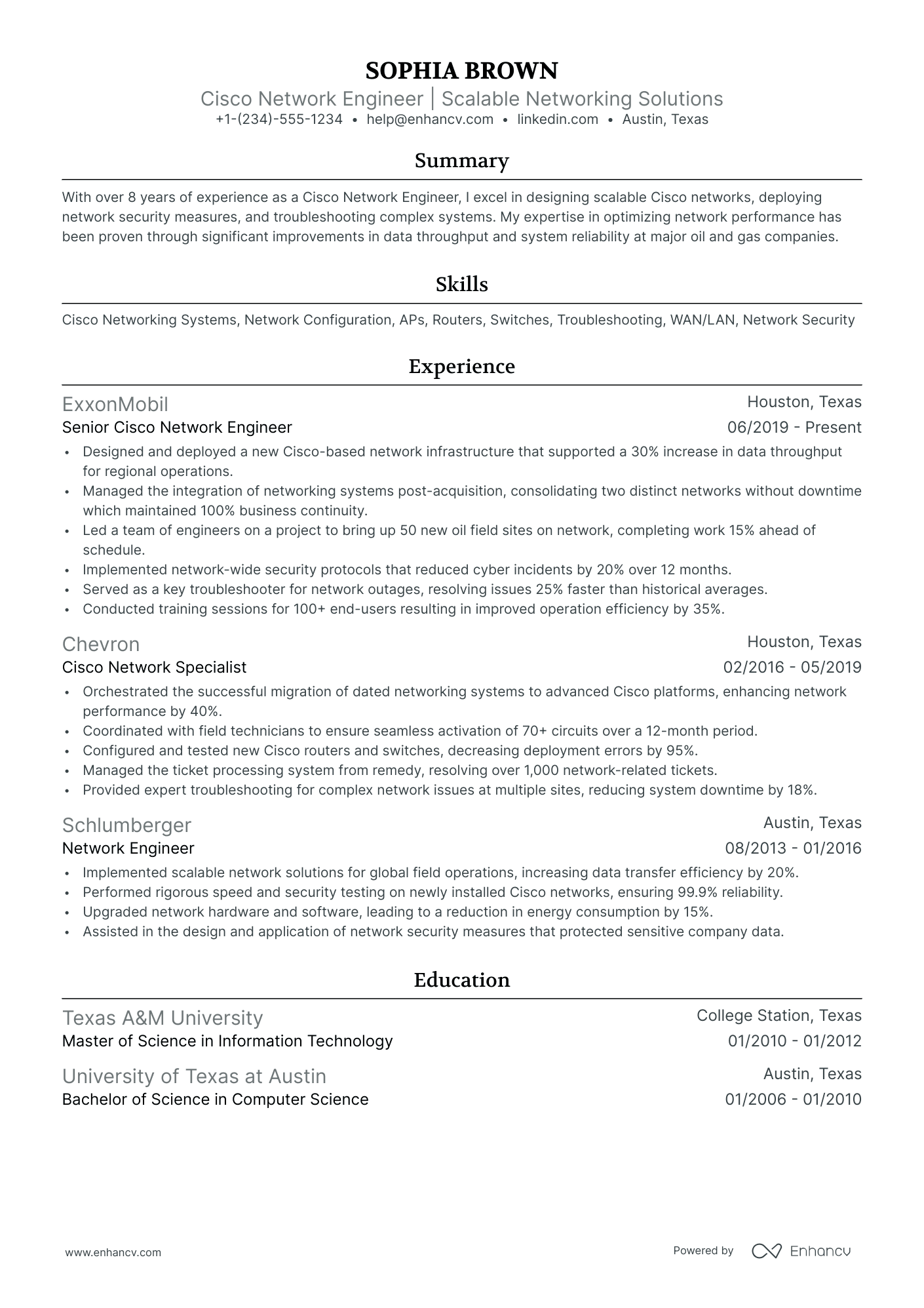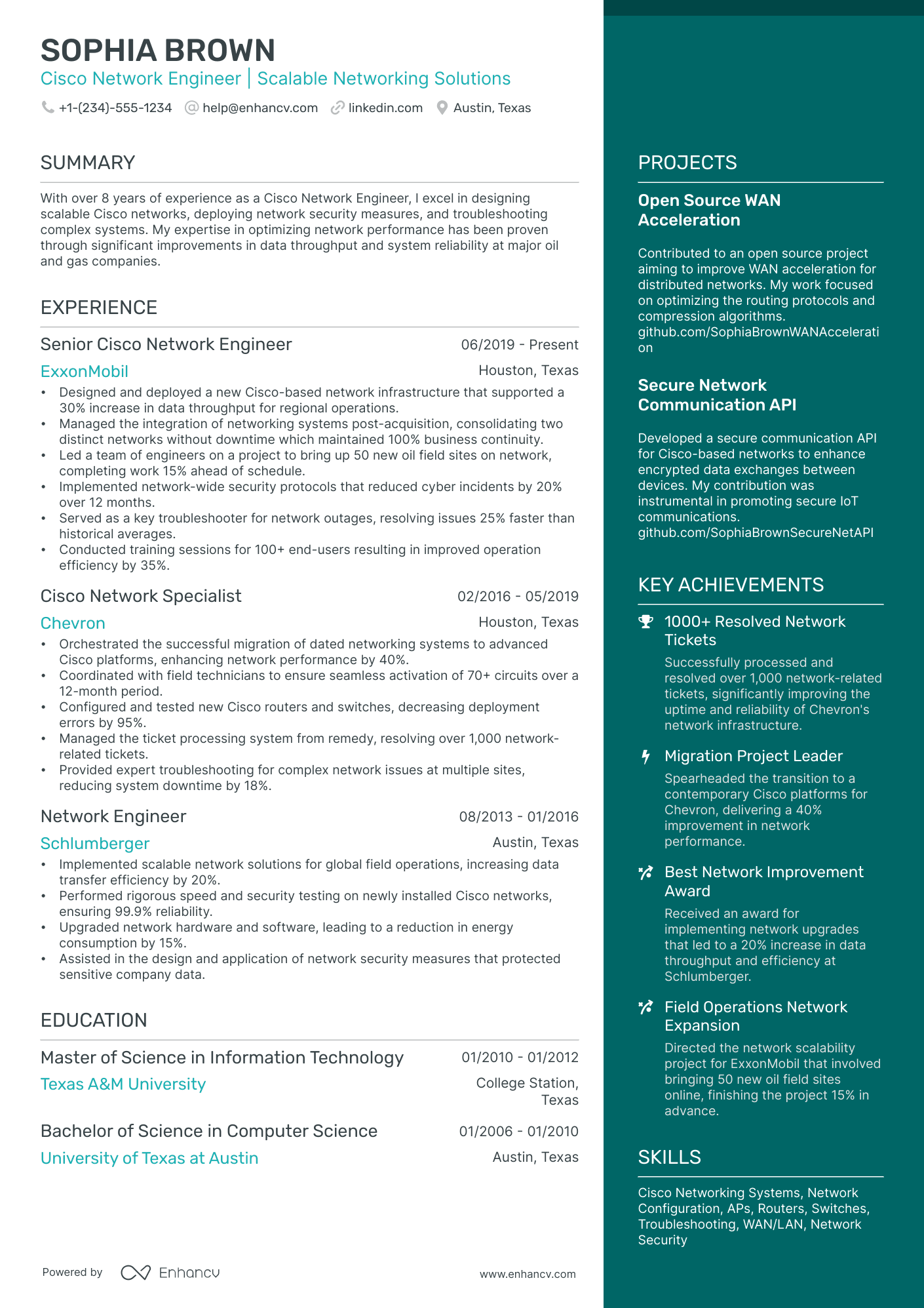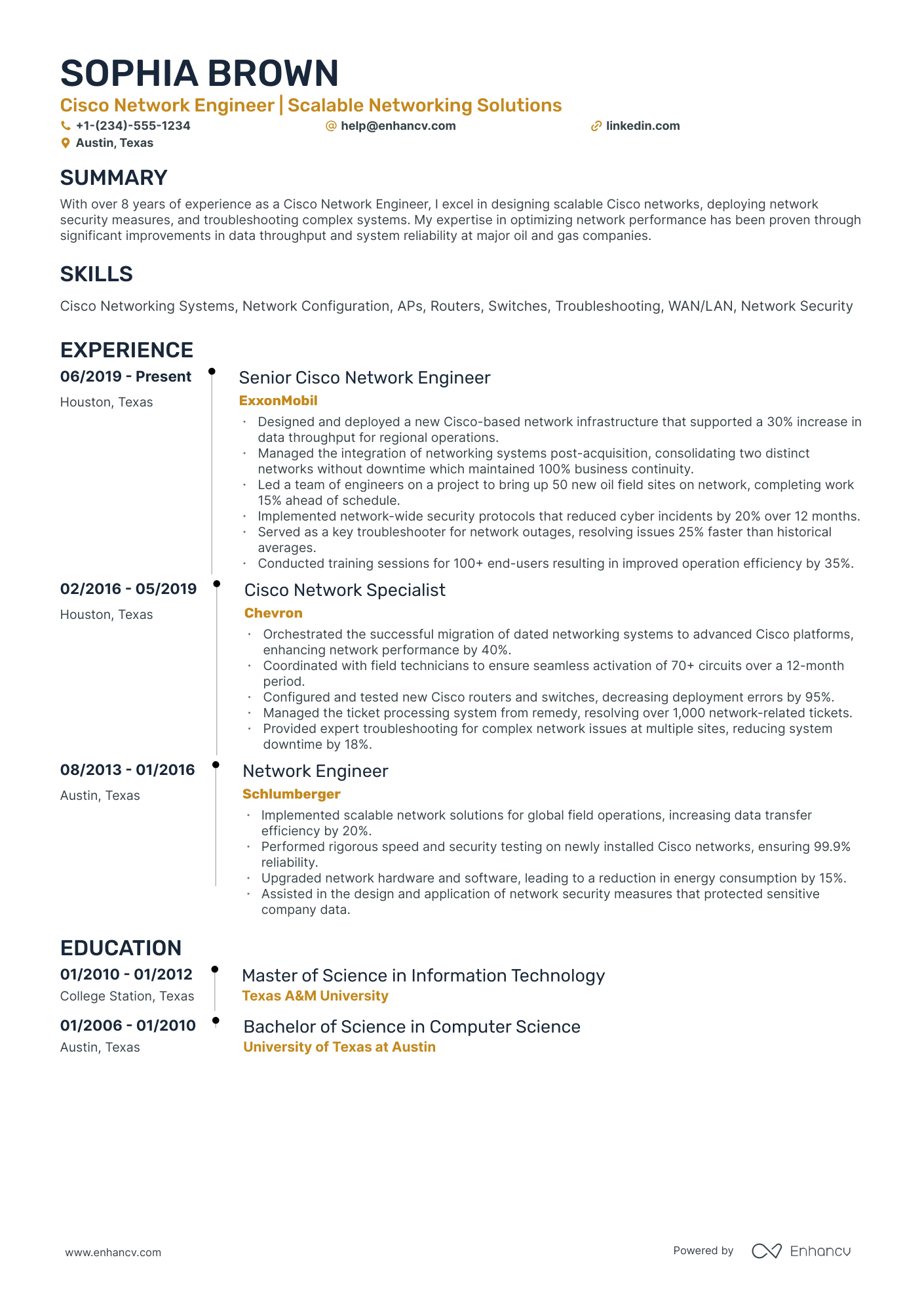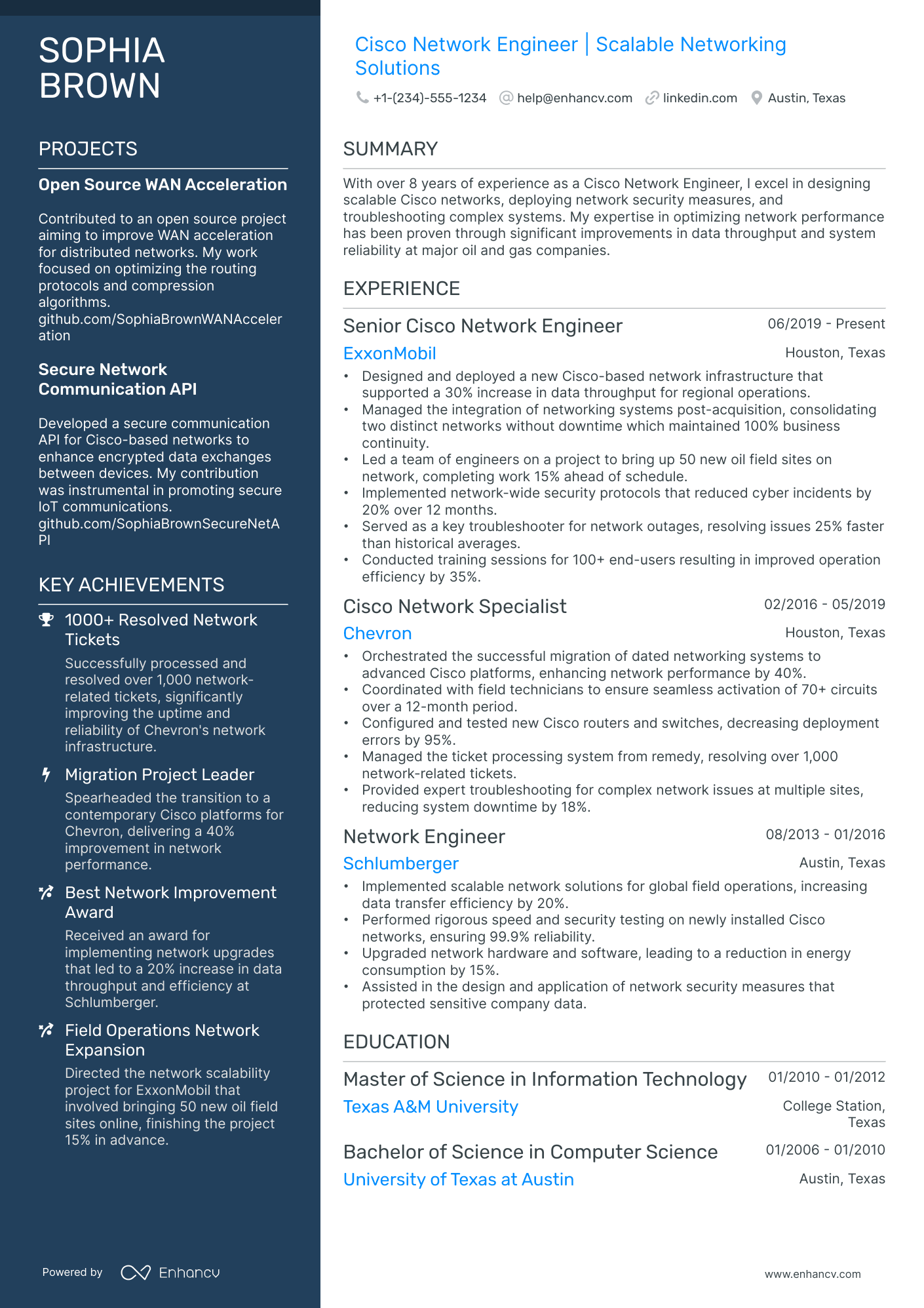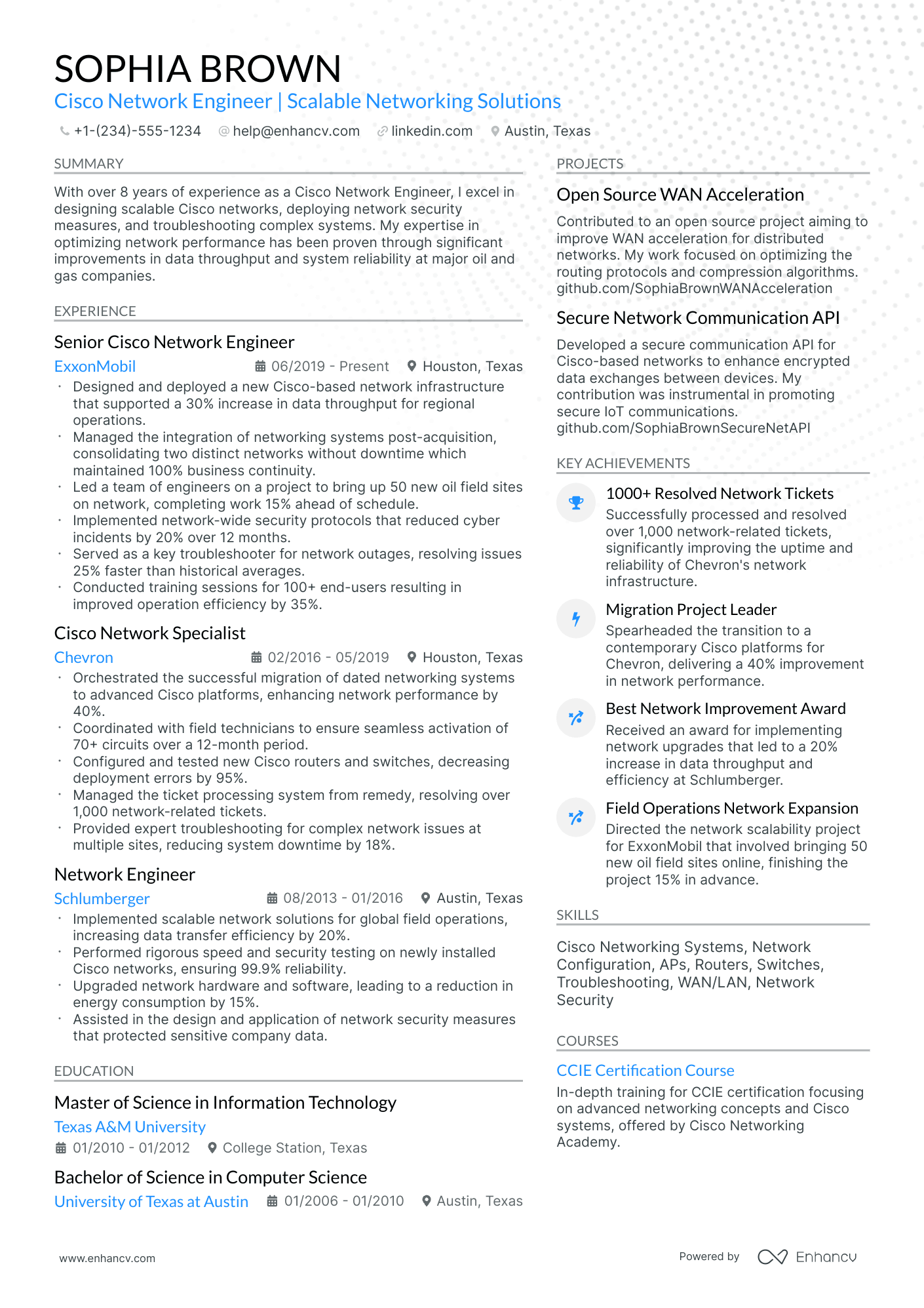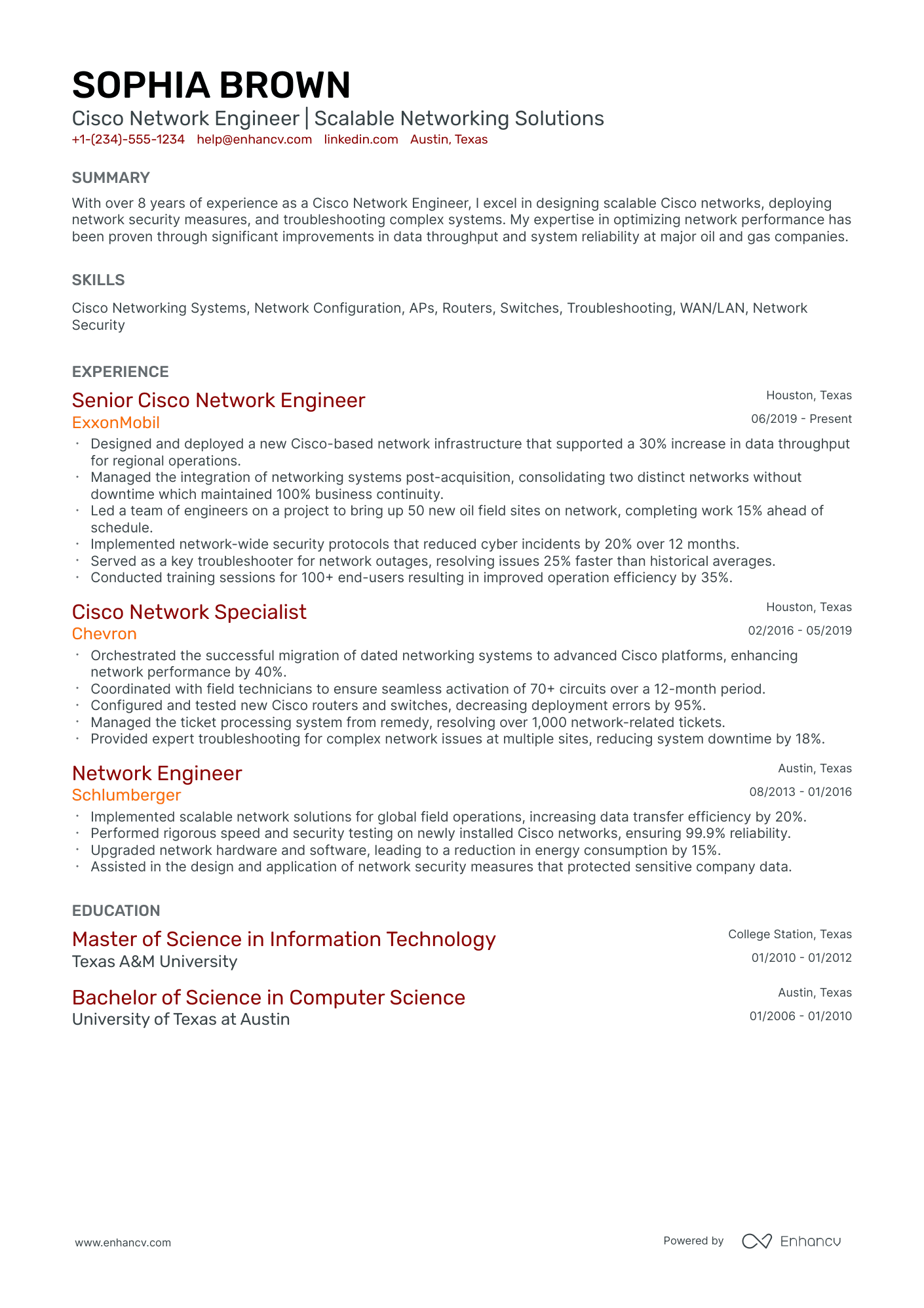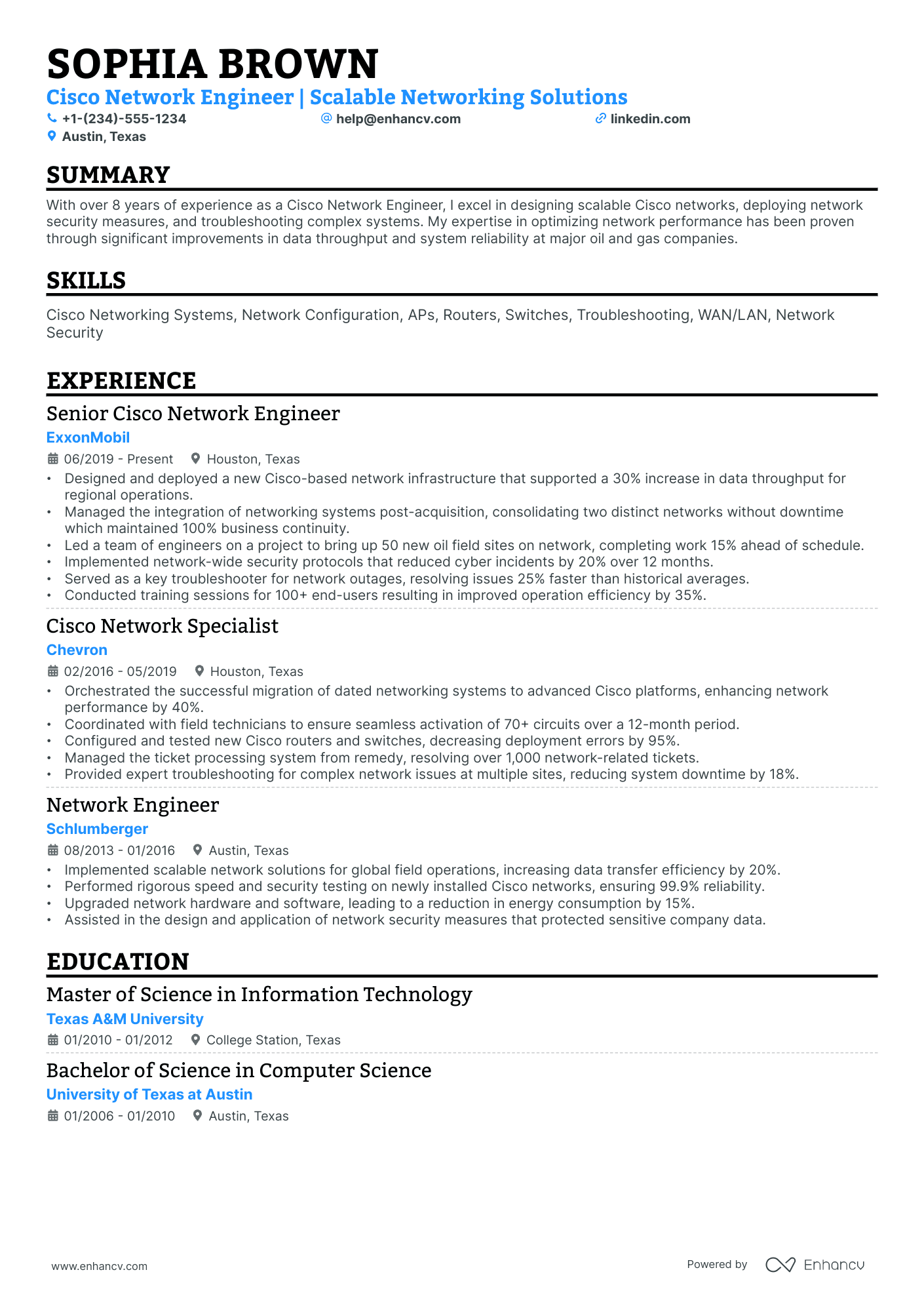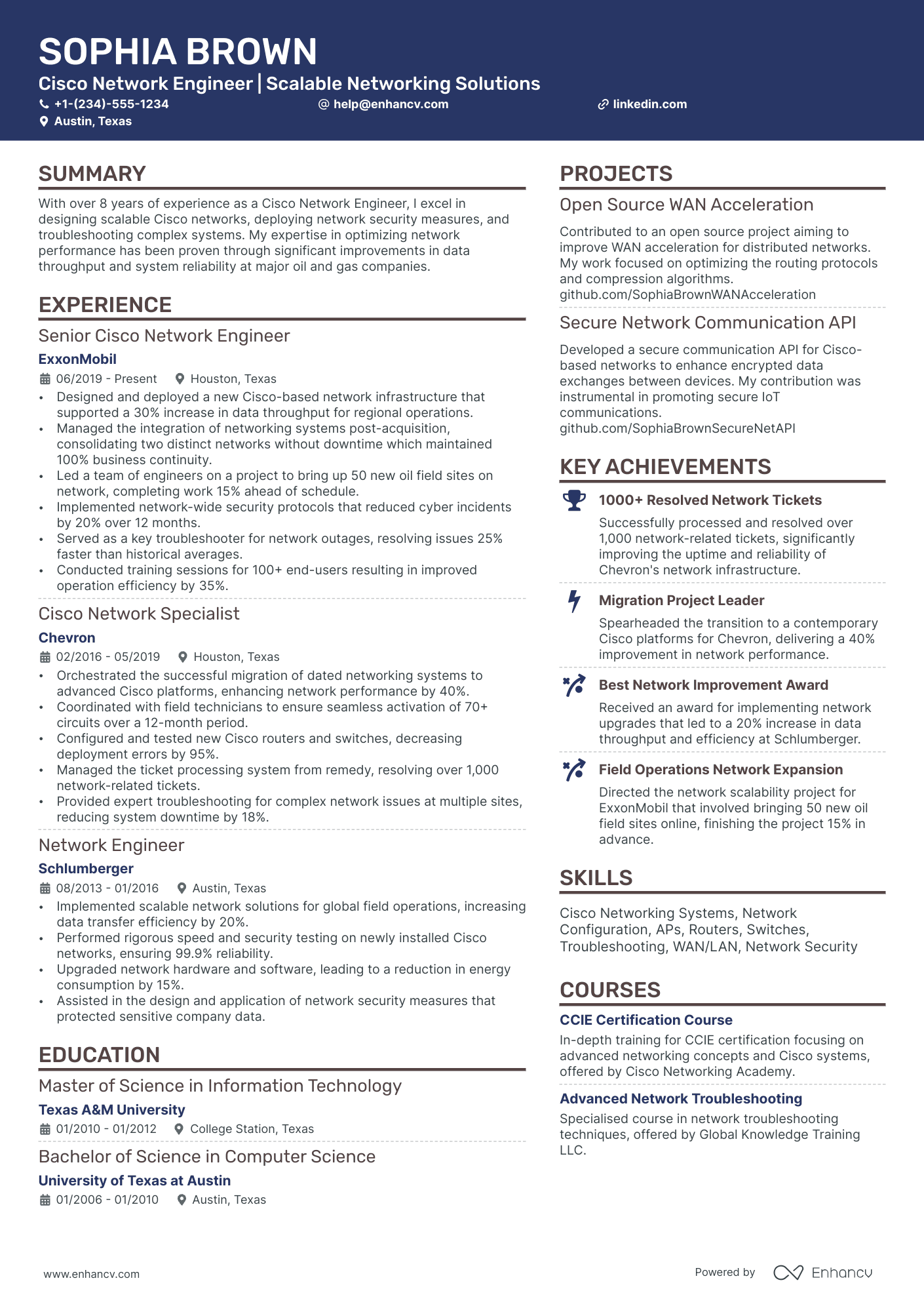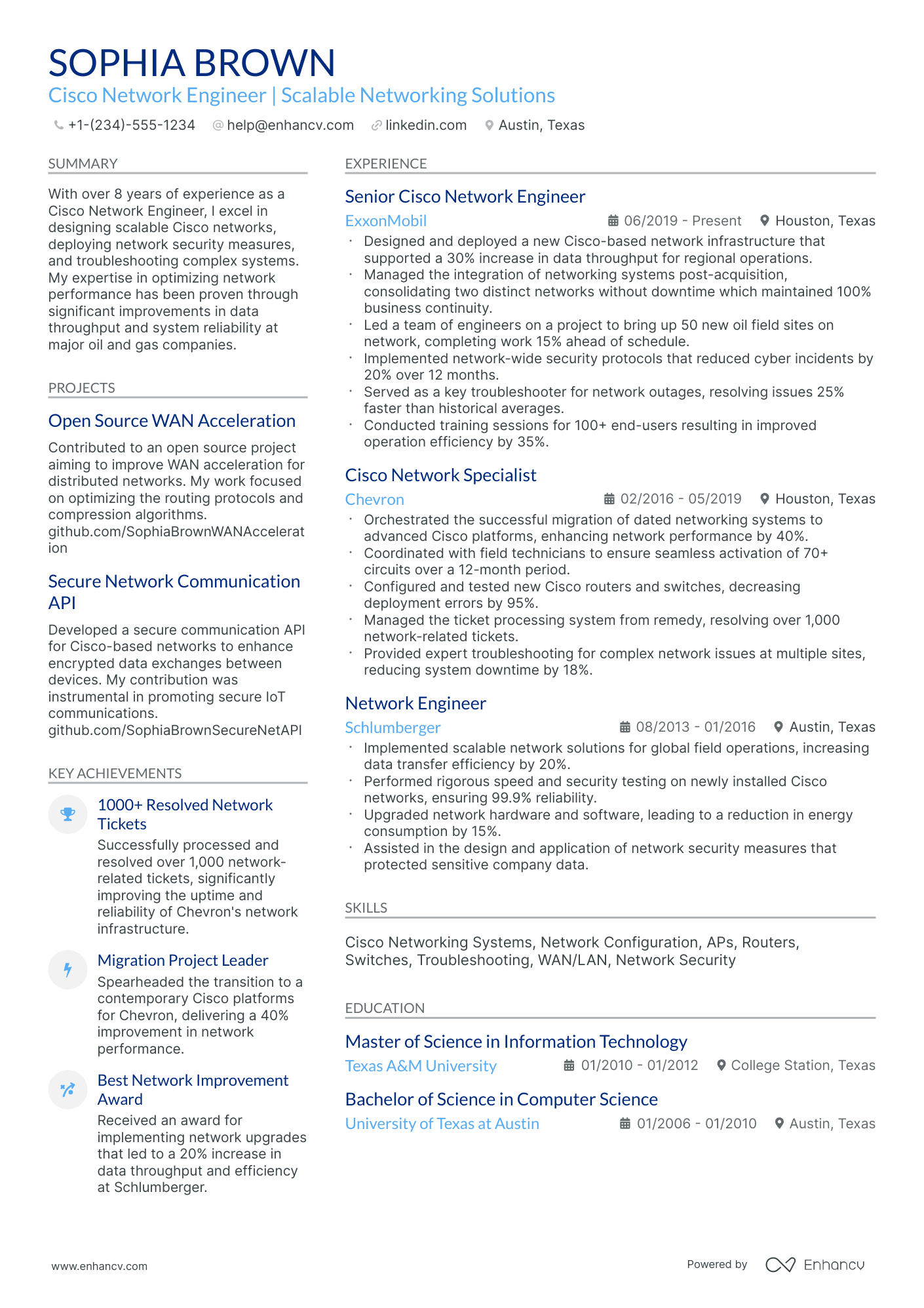Many Cisco network engineer resume submissions fail because they list certifications and tools but skip measurable impact and network scope. That hurts now because applicant tracking system filters and fast recruiter scans reward specificity in a crowded market. Understanding how to make your resume stand out is critical when competing against hundreds of similarly credentialed candidates.
A strong resume shows what you improved and how it changed reliability, speed, and risk. You should highlight reduced outage minutes, improved latency, delivered multi-site migrations, raised change success rates, and cut ticket volume. Quantify device counts, sites, uptime, and security outcomes.
Key takeaways
- Quantify network impact with metrics like uptime, latency, incident reduction, and device counts.
- Tailor each resume to the job posting's specific Cisco platforms, protocols, and compliance frameworks.
- Use reverse-chronological format if experienced and hybrid format if switching careers or junior.
- Demonstrate skills through outcome-driven experience bullets, not standalone keyword lists.
- Place certifications prominently—CCNA, CCNP, and CCIE often carry as much weight as degrees.
- Entry-level candidates should lead with lab projects, homelab builds, and documented configurations.
- Build your resume faster with Enhancv's tools to turn vague duties into measurable, recruiter-ready bullets.
How to format a Cisco network engineer resume
Recruiters evaluating Cisco network engineer candidates prioritize hands-on experience with Cisco platforms (routers, switches, firewalls, wireless controllers), relevant certifications (CCNA, CCNP, CCIE), and demonstrated ability to design, deploy, and troubleshoot enterprise network environments. Choosing the right resume format ensures these technical qualifications and project outcomes are immediately visible rather than buried beneath formatting that disrupts ATS parsing or recruiter scanning.
I have significant experience in this role—which format should I use?
Use a reverse-chronological format to present your Cisco networking career in a clear, linear progression that highlights growing technical scope and project ownership. Do:
- Lead each role entry with your scope of responsibility—number of sites managed, network size (devices, users, VLANs), and ownership of architecture decisions across LAN, WAN, SD-WAN, or data center environments.
- Specify the Cisco technologies and platforms you've worked with directly, including IOS/IOS-XE, NX-OS, ASA/Firepower, ISE, DNA Center, Meraki, ACI, or relevant wireless and VoIP platforms.
- Quantify outcomes tied to network performance, uptime, cost savings, or security posture improvements resulting from your engineering decisions.
I'm junior or switching into this role—what format works best?
A hybrid format works best, allowing you to feature your Cisco skills and certifications prominently while still providing a chronological work history that demonstrates relevant hands-on experience. Do:
- Place a dedicated skills section near the top of your resume covering Cisco certifications (CCNA, CCNP), protocols (OSPF, EIGRP, BGP, STP, VTP), and tools (Packet Tracer, GNS3, Wireshark) so recruiters and ATS systems register your technical fit immediately.
- Include lab projects, homelab environments, internships, or IT support roles where you configured, monitored, or troubleshot network infrastructure—even if outside a formal Cisco network engineer title.
- Connect every listed skill or project to a concrete action and a measurable or observable result.
Why not use a functional resume?
A functional resume strips away the chronological context that recruiters need to verify where and when you applied your Cisco networking skills, making it harder to assess hands-on experience depth and growth trajectory.
- Career changers moving from general IT support or help desk roles into Cisco network engineering may use a functional format if they lack direct job titles in networking but have completed CCNA/CCNP certifications and built relevant lab or project experience.
- Candidates with significant resume gaps who maintained skills through self-study, freelance network consulting, or volunteer infrastructure work can use a functional layout to foreground those efforts.
With your resume's structure and layout in place, the next step is filling it with the right sections to showcase your qualifications effectively.
What sections should go on a Cisco network engineer resume
Recruiters expect to see proof you can design, secure, and troubleshoot Cisco networks in production environments. Knowing what to put on a resume for this role ensures you include the right details without cluttering your document.
Use this structure for maximum clarity:
- Header
- Summary
- Experience
- Skills
- Projects
- Education
- Certifications
- Optional sections: Awards, Open-source work, Languages
Strong experience bullets should emphasize measurable impact, network scope, uptime and performance outcomes, and the results of your troubleshooting and change work.
Is your resume good enough?
Drop your resume here or choose a file. PDF & DOCX only. Max 2MB file size.
Once you’ve organized your resume with the key components hiring managers expect, the next step is to write your Cisco network engineer experience section so it supports each part with clear, results-focused detail.
How to write your Cisco network engineer resume experience
Your work experience section proves you can design, deploy, and maintain enterprise network infrastructure—not just describe daily tasks. Hiring managers prioritize demonstrated impact, so every bullet should connect a Cisco-specific tool, protocol, or method to a measurable outcome that moved the business forward.
Each entry should include:
- Job title
- Company and location (or remote)
- Dates of employment (month and year)
Three to five concise bullet points showing what you owned, how you executed, and what outcomes you delivered:
- Ownership scope: the network environments, Cisco platforms, routing and switching architectures, or site infrastructures you were directly accountable for maintaining, upgrading, or scaling.
- Execution approach: the Cisco technologies, protocols, configuration frameworks, or monitoring tools you relied on to troubleshoot issues, plan capacity, and deliver stable network services.
- Value improved: the specific gains in network uptime, latency reduction, security posture, throughput, or disaster recovery readiness your work produced for the organization.
- Collaboration context: how you partnered with security teams, systems administrators, cloud engineers, vendors, or business stakeholders to align network design with broader operational and compliance requirements.
- Impact delivered: the business-level results your network engineering work created—expressed through service reliability improvements, cost reductions, migration completions, or infrastructure scale rather than a list of activities performed.
Experience bullet formula
A Cisco network engineer experience example
✅ Right example - modern, quantified, specific.
Senior Cisco Network Engineer
NorthBridge Health Systems | Remote
2021–Present
Supported a multi-site healthcare network serving 15,000+ users across twelve clinics and two data centers with strict uptime and compliance requirements.
- Led a campus refresh deploying 220 Cisco Catalyst 9300/9500 switches with Cisco DNA Center automation, cutting provisioning time by 65% and reducing configuration drift incidents by 40%.
- Migrated WAN to dual-ISP SD-WAN using Cisco Catalyst SD-WAN (Viptela) with DIA breakout and application-aware routing, improving critical app latency by 28% and increasing site uptime to 99.98%.
- Hardened perimeter security by implementing Cisco Firepower Threat Defense with intrusion prevention system tuning, AnyConnect multi-factor authentication, and segmentation, reducing high-severity security events by 52%.
- Improved wireless performance by redesigning Cisco Catalyst 9800 and Cisco Identity Services Engine (Cisco ISE) policies for 802.1X and guest access, raising successful client authentication to 99.6% and cutting help desk tickets by 33%.
- Partnered with server, security, and clinical application teams to standardize network change control in ServiceNow and validate releases in a lab, lowering change-related incidents by 30% and accelerating maintenance windows by 20%.
Now that you've seen how a strong experience section comes together, let's break down how to adjust yours to match a specific Cisco network engineer job posting.
How to tailor your Cisco network engineer resume experience
Recruiters evaluate your Cisco network engineer resume through both human review and applicant tracking systems (ATS). Tailoring your resume to the job description ensures your qualifications align directly with what the hiring team needs.
Ways to tailor your Cisco network engineer experience:
- Match specific Cisco platforms and IOS versions listed in the posting.
- Mirror the job's terminology for routing protocols like OSPF or BGP.
- Reflect network security standards or compliance frameworks the role requires.
- Highlight experience with the exact monitoring tools the employer uses.
- Align your achievements with the performance or uptime KPIs mentioned.
- Include relevant industry experience when the posting specifies a sector.
- Reference the collaboration workflows or escalation models they describe.
- Emphasize certifications like CCNP or CCIE that the listing prioritizes.
Tailoring means aligning your real accomplishments with the role's stated requirements—not inserting keywords where they don't belong.
Resume tailoring examples for Cisco network engineer
| Job description excerpt | Untailored | Tailored |
|---|---|---|
| "Design, implement, and maintain enterprise LAN/WAN infrastructure using Cisco Catalyst and Nexus switches across multiple data centers" | Managed network switches and handled various infrastructure tasks for the company. | Designed and maintained LAN/WAN infrastructure across three data centers, deploying over 200 Cisco Catalyst 9000 and Nexus 7000 series switches with 99.98% uptime. |
| "Troubleshoot complex routing issues using OSPF, BGP, and EIGRP protocols and perform root cause analysis on network outages in a 24/7 environment" | Worked on routing problems and helped keep the network running smoothly. | Performed root cause analysis on 150+ network outages annually in a 24/7 NOC environment, resolving complex OSPF, BGP, and EIGRP routing issues with a mean time to resolution under 45 minutes. |
| "Configure and manage Cisco ASA and Firepower firewalls, implement VPN solutions, and ensure compliance with enterprise security policies using Cisco ISE" | Handled firewall configurations and helped with security compliance across the organization. | Configured and managed 30+ Cisco ASA 5500-X and Firepower 2100 firewalls, deployed site-to-site and remote-access VPN solutions for 2,000 users, and enforced NAC policies through Cisco ISE to maintain compliance with SOC 2 security standards. |
Once you’ve aligned your experience with the role’s priorities, the next step is to quantify your Cisco network engineer achievements so hiring teams can see the impact behind your work.
How to quantify your Cisco network engineer achievements
Quantifying your achievements proves business impact beyond "kept the network running." Focus on uptime, latency, packet loss, incident reduction, security risk reduction, and delivery speed across sites, devices, and users.
Quantifying examples for Cisco network engineer
| Metric | Example |
|---|---|
| Availability | "Raised core network availability from 99.90% to 99.99% by redesigning HSRP and tuning OSPF timers across two data centers and twelve branch sites." |
| Latency | "Cut average WAN latency by 18 ms by implementing QoS on Cisco ISR and ASR routers and prioritizing voice and video for 1,200 users." |
| Incident reduction | "Reduced P1 network incidents by 35% by standardizing Cisco IOS configurations, adding NetFlow alerts, and automating compliance checks with Ansible." |
| Security risk | "Closed eighty-seven high-risk findings by hardening AAA with TACACS+, enforcing SSH-only access, and segmenting VLANs with access control lists." |
| Delivery speed | "Deployed a new SD-WAN fabric to twenty-eight branches in six weeks using Cisco vManage templates, finishing two weeks ahead of schedule." |
Turn vague job duties into measurable, recruiter-ready resume bullets in seconds with Enhancv's Bullet Point Generator.
Once you've crafted strong bullet points for your experience section, you'll want to apply that same precision to presenting your hard and soft skills throughout your Cisco network engineer resume.
How to list your hard and soft skills on a Cisco network engineer resume
Your skills section shows you can design, secure, and troubleshoot Cisco networks, and recruiters and ATS scan this section for exact platform and protocol keywords; aim for a balanced mix of hard skills and role-specific soft skills aligned to the job post. Cisco network engineer roles require a blend of:
- Product strategy and discovery skills.
- Data, analytics, and experimentation skills.
- Delivery, execution, and go-to-market discipline.
- Soft skills.
Your skills section should be:
- Scannable (bullet-style grouping).
- Relevant to the job post.
- Backed by proof in experience bullets.
- Updated with current tools.
Place your skills section:
- Above experience if you're junior or switching careers.
- Below experience if you're mid/senior with strong achievements.
Hard skills
- Cisco IOS, IOS XE, NX-OS
- Routing: OSPF, BGP, EIGRP
- Switching: VLANs, STP, EtherChannel
- HSRP, VRRP, GLBP
- MPLS, VRF, L3VPN
- Cisco ACI fabric operations
- SD-WAN: Cisco Viptela
- Firewalls: Cisco ASA, Firepower
- VPNs: IPsec, SSL, DMVPN
- Network automation: Python, Ansible
- Infrastructure as Code: Terraform
- Monitoring: SNMP, NetFlow, Syslog
Soft skills
- Translate requirements into designs
- Lead incident triage and recovery
- Write clear change plans
- Communicate risk and impact
- Partner with security and systems teams
- Coordinate maintenance windows
- Document standards and runbooks
- Prioritize fixes by business impact
- Present options with tradeoffs
- Own root cause analysis actions
- Escalate with complete context
- Mentor junior engineers on procedures
How to show your Cisco network engineer skills in context
Skills shouldn't live only in a dedicated skills list. Browse examples of how other professionals present their resume skills to see effective formatting in action.
They should be demonstrated in:
- Your summary (high-level professional identity)
- Your experience (proof through outcomes)
Here's what strong, context-rich examples look like in practice.
Summary example
Senior Cisco network engineer with 10+ years designing enterprise campus and data center architectures. Skilled in BGP/OSPF routing, ASA firewalls, and Cisco ACI. Reduced network downtime 40% through proactive capacity planning and cross-team collaboration.
- Reflects senior-level experience clearly
- Names specific Cisco tools and protocols
- Leads with a measurable outcome
- Highlights collaboration as a soft skill
Experience example
Senior Network Engineer
Redstone Communications | Denver, CO
March 2019–Present
- Redesigned the OSPF routing topology across 12 regional offices with Cisco Catalyst 9000 switches, cutting latency by 28%.
- Partnered with the security team to deploy Cisco ISE for network access control, reducing unauthorized access incidents by 65%.
- Migrated legacy WAN infrastructure to Cisco SD-WAN (Viptela), saving $180K annually while improving uptime to 99.97%.
- Every bullet includes a measurable result.
- Skills surface naturally through real achievements.
Once you’ve demonstrated your networking strengths through specific, real-world examples, the next step is applying that approach to a Cisco network engineer resume when you don’t have formal experience.
How do I write a Cisco network engineer resume with no experience
Even without full-time experience, you can demonstrate readiness through:
- Cisco Packet Tracer lab builds
- GNS3 routing and switching labs
- CCNA coursework and practice exams
- Home lab with Cisco gear
- Volunteer network support for nonprofits
- School capstone network design project
- Internship or job shadowing hours
- GitHub portfolio of network configs
Writing a resume without work experience means focusing on transferable projects and documented technical skills.
Focus on:
- Documented labs with topology diagrams
- Cisco IOS configurations and backups
- Troubleshooting steps with outcomes
- Security basics: VLANs, ACLs
Resume format tip for entry-level Cisco network engineer
Use a hybrid resume format that leads with skills and projects, then lists experience. It highlights hands-on labs and outcomes when work history is limited. Do:
- Put a Projects section above Experience.
- List tools: Cisco IOS, Packet Tracer, GNS3.
- Add metrics: latency, uptime, ticket count.
- Include config examples: VLANs, OSPF, ACLs.
- Link to a GitHub portfolio.
- Built a Cisco Packet Tracer campus lab with VLANs, inter-VLAN routing, and ACLs; cut broadcast traffic by 30% and documented configs in GitHub.
Even without hands-on experience, your academic background and relevant coursework can serve as the foundation of your resume—so let's look at how to present your education effectively.
How to list your education on a Cisco network engineer resume
Your education section helps hiring teams confirm you have the foundational technical knowledge a Cisco network engineer needs. It validates your background in networking, systems, and infrastructure.
Include:
- Degree name
- Institution
- Location
- Graduation year
- Relevant coursework (for juniors or entry-level candidates)
- Honors & GPA (if 3.5 or higher)
Skip month and day details—list the graduation year only.
Here's a strong education entry tailored to a Cisco network engineer:
Example education entry
Bachelor of Science in Network Engineering
Georgia Institute of Technology, Atlanta, GA
Graduated 2021
GPA: 3.7/4.0
- Relevant Coursework: Cisco Routing & Switching, Network Security, TCP/IP Protocols, Wireless Network Design, Network Automation
- Honors: Magna Cum Laude, Dean's List (six semesters)
How to list your certifications on a Cisco network engineer resume
Certifications on your resume show your commitment to learning, prove hands-on tool proficiency, and signal industry relevance as a Cisco network engineer.
Include:
- Certificate name
- Issuing organization
- Year
- Optional: credential ID or URL
- Place certifications below education when your degree is recent and directly supports your Cisco network engineer path.
- Place certifications above education when they are recent, role-relevant, or your primary proof of Cisco network engineer skills.
Best certifications for your Cisco network engineer resume
- Cisco Certified Network Associate (CCNA)
- Cisco Certified Network Professional Enterprise (CCNP Enterprise)
- Cisco Certified Specialist—Enterprise Core (ENCOR)
- Cisco Certified Specialist—Enterprise Advanced Infrastructure Implementation (ENARSI)
- Cisco Certified DevNet Associate
- Juniper Networks Certified Associate—Juniper Networks Certified Internet Associate (JNCIA-Junos)
- CompTIA Network+
Once you’ve positioned your Cisco credentials where recruiters can quickly verify them, shift to writing your Cisco network engineer resume summary to highlight those qualifications upfront.
How to write your Cisco network engineer resume summary
Your resume summary is the first thing a recruiter reads. A sharp, specific opening instantly signals you're qualified for this Cisco network engineer role.
Keep it to three to four lines, with:
- Your title and total years of hands-on networking experience.
- The domain you've worked in, such as enterprise, data center, or service provider environments.
- Core technologies like Cisco IOS, NX-OS, ASA firewalls, BGP, OSPF, and MPLS.
- One or two measurable achievements, such as uptime improvements or cost reductions.
- Soft skills tied to real outcomes, like cross-team collaboration that shortened deployment timelines.
PRO TIP
At this level, focus on technical depth, relevant certifications, and early project contributions. Highlight specific Cisco platforms you've configured and protocols you've troubleshot. Avoid vague phrases like "passionate team player" or "motivated self-starter." Replace them with concrete skills and measurable results that prove your readiness.
Example summary for a Cisco network engineer
Cisco network engineer with three years of experience managing enterprise LAN/WAN infrastructure. Configured and maintained Cisco Catalyst switches and ASA firewalls across 12 branch offices. Reduced network downtime by 30% through proactive monitoring with SolarWinds.
Optimize your resume summary and objective for ATS
Drop your resume here or choose a file.
PDF & DOCX only. Max 2MB file size.
Now that you've crafted a summary that highlights your expertise, make sure your header presents the essential contact and professional details recruiters need to reach you.
What to include in a Cisco network engineer resume header
Your resume header lists your key identity and contact details, helping Cisco network engineer candidates boost visibility, credibility, and pass recruiter screening faster.
Essential resume header elements
- Full name
- Tailored job title and headline
- Location
- Phone number
- Professional email
- GitHub link
- Portfolio link
Including a LinkedIn link helps recruiters verify experience quickly and supports screening.
Do not include photos on a Cisco network engineer resume unless the role is explicitly front-facing or appearance-dependent.
Use a job title that matches the posting and add one Cisco network engineer specialty to align with recruiter keyword filters.
Cisco network engineer resume header
Jordan Ramirez
Cisco network engineer | Routing and switching, Cisco IOS, WAN troubleshooting
Austin, TX
(512) 555-01XX
jordan.ramirez@enhancv.com
github.com/jordanramirez
jordanramirez.com
linkedin.com/in/jordanramirez
Once your contact details and role focus are clear at the top, add targeted additional sections to reinforce your qualifications and provide hiring managers with supporting context.
Additional sections for Cisco network engineer resumes
When your core qualifications match other applicants, well-chosen additional sections can set your Cisco network engineer resume apart from the competition. For example, listing language skills can be especially valuable if you support global network infrastructure or work with international teams.
- Languages
- Certifications and continuous education
- Publications and technical blog contributions
- Professional affiliations and memberships
- Hobbies and interests
- Volunteer work in IT or networking
- Conference presentations and speaking engagements
Once your resume's additional sections reinforce your networking expertise, pairing it with a strong cover letter can further set your application apart.
Do Cisco network engineer resumes need a cover letter
A cover letter isn't required for a Cisco network engineer, but it helps in competitive roles or when hiring managers expect one. If you're unsure where to start, understanding what a cover letter is and how it complements your resume can clarify its value. It can make a difference when your resume needs context or when you want to show clear team fit fast.
Use a cover letter to add details your resume can't:
- Explain role or team fit by matching your routing, switching, security, or wireless focus to the team's environment and priorities.
- Highlight one or two relevant projects or outcomes, including scale, tools, and results like reduced outages, faster change windows, or improved latency.
- Show understanding of the product, users, or business context, such as uptime targets, compliance needs, or customer impact during maintenance.
- Address career transitions or non-obvious experience by connecting past work to Cisco network engineer responsibilities and the role's technical requirements.
Drop your resume here or choose a file.
PDF & DOCX only. Max 2MB file size.
Once you’ve decided whether to include a cover letter based on the role and hiring process, the next step is using AI to improve your Cisco network engineer resume so it aligns more closely with what employers screen for.
Using AI to improve your Cisco network engineer resume
AI can sharpen your resume's clarity, structure, and impact. It helps tighten language and highlight relevant accomplishments. But overuse strips authenticity. If you're exploring this approach, learn more about ChatGPT resume writing prompts to get practical starting points. Once your content is clear and role-aligned, step away from AI.
Here are 10 practical prompts to strengthen specific sections of your Cisco network engineer resume:
- Strengthen your summary: "Rewrite my Cisco network engineer resume summary to highlight routing, switching, and security expertise in under four sentences."
- Quantify experience bullets: "Add measurable outcomes to these Cisco network engineer experience bullets, focusing on uptime, latency reduction, or cost savings."
- Tailor skills formatting: "Organize my Cisco network engineer skills section into categories like routing protocols, security tools, and cloud networking platforms."
- Improve project descriptions: "Rewrite this Cisco network engineer project description to emphasize scope, technologies used, and business impact in three bullet points."
- Align with job postings: "Compare my Cisco network engineer resume experience section against this job description and identify missing keywords or skills."
- Refine certification entries: "Format my Cisco network engineer certifications section to highlight CCNP, CCIE, and relevant expiration dates clearly."
- Tighten action verbs: "Replace weak verbs in my Cisco network engineer experience bullets with stronger alternatives like deployed, optimized, or migrated."
- Clarify education relevance: "Rewrite my education section to emphasize coursework and labs most relevant to a Cisco network engineer role."
- Remove redundant phrasing: "Identify and remove filler words or redundant phrases across my entire Cisco network engineer resume."
- Boost troubleshooting examples: "Rewrite these Cisco network engineer experience bullets to clearly show the problem diagnosed, action taken, and result achieved."
Stop using AI once your resume sounds accurate, specific, and true to your real experience. AI should never invent experience or inflate claims—if it didn't happen, it doesn't belong here.
Conclusion
A strong Cisco network engineer resume proves impact with measurable outcomes, role-specific skills, and a clear structure. Use metrics like uptime, latency reduction, incident time, and project delivery. Highlight routing, switching, security, and troubleshooting with the tools you used.
Keep each section scannable, consistent, and focused on what you can deliver now. This approach matches today’s hiring market and supports near-future needs across hybrid networks, automation, and security. With clear results and relevant skills, your Cisco network engineer resume will stand out.
